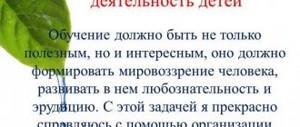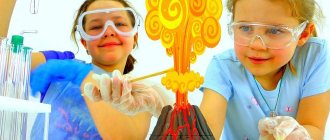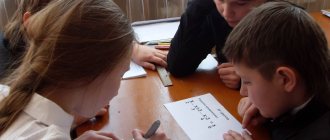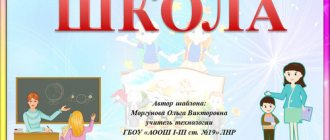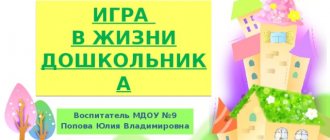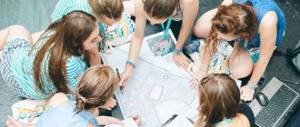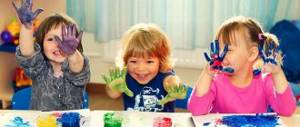Methodological recommendations “Organization of experimental activities of preschool children”
Selection and preparation of benefits and equipment taking into account the age of children.
Summarizing the results of observations (diaries, tables, photographs) in order to lead children to independent conclusions.
Forms of working with children
(methods and techniques).
1. Experimental game: helps to verify the reliability of the phenomena. 2. Practical activities. Actions (with magnets, magnifying glass, measuring instruments). Allows you to independently master the method of cognitive activity. 3. Observations in real life, excursions (melting snow, fog, rainbows, dew). Encourages the search for explanations of the causes of natural phenomena. 4. Examination of diagrams, tables, drawings. Allows you to simplify the understanding of complex phenomena at the preschool level. 5. Use of encyclopedic data. Develops interest and intelligence. 6. Dramatization game. The child takes on the role – explains, teaches.
Specially organized research activities
allows children to obtain information about the objects and phenomena being studied themselves, and allows the teacher to make the learning process as effective as possible and more fully satisfy the natural curiosity of preschoolers.
Organization of an experimentation corner
—
The material located in the corner is located in a place accessible to children. — There should be sufficient materials for experiments and tests. — The equipment of the corner is selected taking into account the age and level of development of the children. — Material for experimentation is divided into sections.
Experimentation corner equipment
— Instruments: magnifying glasses (magnifying glasses), microscopes, hourglasses, magnets, mirrors, etc. — Vessels made of various materials of different volumes and shapes: flasks, test tubes, glasses, cups, etc. — Natural materials: pebbles, cones, shells, moss, etc. - Different types of paper: cardboard, whatman paper, tracing paper, corrugated paper, etc. - Dyes: food and non-food: watercolor, gouache, etc. - Medical materials: cotton wool, pieces of gauze, measuring spoons , wooden sticks, etc. - Bulk materials: cereals, sand, flour, etc. - Other materials.
Conclusion
The world of a child is diverse. It is important to teach him to find unknown properties in familiar objects, and long-familiar ones in unfamiliar ones. And all this in the atmosphere of the game. While playing, a child gets acquainted with the world around him and learns new things more easily and willingly. It is important to encourage and cultivate the habit of learning. Many phenomena are incomprehensible to children. Acquaintance with physical phenomena serves as a means for accumulating impressions about the world around us and acts as a tool for the development of mental activity. Entertaining experiences and experiments encourage children to independently search for reasons and methods of action. The proposed methodological recommendations indicate how to achieve this.
Organization of experimental activities in preschool educational institutions
Bibliographic description:
Chernenko, M. A. Organization of experimental activities in preschool educational institutions / M. A. Chernenko. — Text: direct // Questions of preschool pedagogy. — 2020. — No. 3 (13). — P. 95-98. — URL: https://moluch.ru/th/1/archive/92/3332/ (date of access: 10.10.2020).
Preschoolers are natural explorers. And this is confirmed by their curiosity and continuous desire to experiment, the desire to always find a solution in the presence of a problem situation. Information about the world around us is absorbed more firmly and for a long time when the child sees, hears and does everything independently.
To explore, to discover, to study—this involves taking a step into what is unknown. “At one time, I.M. Sechenov wrote about the innate and “extremely precious” characteristic of the neuropsychic organization of children - an unconscious desire to understand the life around them.
Currently, the question is about improving the quality of upbringing and education of the younger generation at all levels of the educational system of our country. A special type of pedagogical work, covering all aspects of activity, is experimentation. Children's experimentation is a complex, multifaceted process that includes both live observation and experiments conducted by the child. During its course, the preschooler gradually masters the model of research activity - from posing a problem to putting forward a hypothesis and testing it experimentally.
The world of children is a wonderful world - a world of whys. Our children are very active and inquisitive. They always have many questions that they immediately want answered. So that children can independently find answers to all their questions, we began research activities on inanimate nature at the preschool educational institution: “Young Researchers”. Teachers try to draw the children’s attention to the fact that even familiar objects: water, sun, air, sand contain quite a lot of unknowns. Despite their rather early age, children need to be taught the skills of environmentally literate attitudes in nature, in everyday life, and in everyday life.
In the educational process of a preschool institution, children's experimentation allows the child to model in his mind a picture of the world based on his own observations and experiences, and to establish relationships and patterns. Experimental activities arouse the child's interest in exploring nature, develop mental operations (analysis, synthesis, classification, generalization), stimulate cognitive activity and curiosity.
By organizing work on experimental activities, we provide for the inclusion of preschoolers in meaningful activities, during which they themselves could discover more and more new properties of objects, notice their similarities and differences.
In a word, children are given the opportunity to acquire knowledge independently in accordance with the federal state educational standard for preschool education.
We strive to see students as sociable, inquisitive, creative, independent individuals who know how to navigate their surroundings and successfully solve emerging problems, which largely depends on us. All researchers of experimentation highlight the main characteristic feature of the cognitive activity of children: the child learns an object in the process of practical work with it, the practical actions performed by the child have a cognitive, indicative and research function, forming the conditions in which the content of a particular object is revealed.
The relevance of the chosen experience is that in the conditions of a modern preschool institution, one of the significant tasks is the optimization of pedagogical work aimed at developing creative initiative and independence in the process of experimentation.
The main goal of the preschool educational institution: the development of cognitive interests, needs and independent search activities on the basis of enriched and formed emotional and sensory experience. This goal corresponds to the Federal Law “On Education in the Russian Federation” and the Federal State Educational Standard for Education.
The novelty of the work on the introduction of experimental activities in preschool educational institutions: organizational innovation - modeling of social partnership with the center of research and production work. Social partnership promotes the development and popularization of cognitive and research activities of preschool children and is a condition for the manifestation of high intellectual abilities. The knowledge acquired by a child as a result of his own experiment and research is much stronger and more reliable than the information about the world that is obtained through reproduction.
The pedagogical feasibility of this experience lies in the fact that experimentation permeates all areas of children’s activities, enriching memory, activating thought processes, developing speech, and stimulating the child’s personal development.
– The content of the work on experimental activities is based on personality-oriented learning and has variability and a differentiated approach.
– Special tasks are carried out to diagnose and develop the creative potential of children by performing creative tasks.
The methodology for performing experimentation in the pedagogical process is not too complicated. In a children's institution there should not be a clear line between simple life and experimentation. Experiments are not an end in themselves, they are only a method of getting to know the world around them in which children will have to exist. The work is carried out in the afternoon, once during the week for 20 minutes, for a total of 36 hours planned for the academic year. When working with children, an individual approach is used, which is based on perception, which is associated with the development of technical skills and emotional responsiveness of each child to a specific proposed task.
For an effective and successful educational process in this area, the subject-development environment has been transformed in preschool groups and centers for experimental research work have been formed.
Our kindergarten practices the method of controlled and organized children's experimentation.
During the experiment, the child gets the opportunity to successfully satisfy his inherent curiosity (why? how? why? what will happen if?), to feel like a scientist and a discoverer.
Experimentation runs through all areas of children's activities: eating, studying, walking, playing, sleeping. Animals and plants, inanimate objects and people can be subject to research.
By organizing, showing, offering the child various methods of examination: touching, stroking, looking, tasting, holding, etc., the teacher provides assistance in mastering the properties and qualities of materials and objects, pronouncing their names, that is, stimulating development active speech. Children love to conduct research on new objects, experiment with various materials and substances: paints, water, snow, sand, clay and other materials. Adults often doubt that young children can seriously learn “important” things. But that's not true. In the course of such research, the child’s curiosity develops, his ideas about the world around him expand, the child gains rich experience, and acquires a powerful impetus for the effective development of intelligence.
It is very important to remember that the formation of the intellectual sphere of children occurs not only with the help of targeted guidance from adults, but also in free, independent practical work.
In the course of free experimentation, the child receives new, sometimes completely unexpected information, establishes practical connections between his own actions and the phenomena of the surrounding world, and makes a certain kind of discovery. Experimentation has a stimulating effect on the child to search for new actions and contributes to the development of flexibility of thinking. Independent experimentation provides children with the opportunity to try different methods of action, while removing the fear of possible mistakes and the constraint of thinking by action patterns. The role of an adult in this process is not to immediately show how to act correctly, but to stimulate the child’s interest in objects, awaken him to independent research, and support his natural curiosity. Pronounced curiosity acts as one of the most important indicators of his successful psychological development. It manifests itself in the fact that the child actively strives to gain new experiences and loves to observe his surroundings; participates with sincere interest in games with various substances offered to adults; Experiments on his own for a long time and with enthusiasm, imitating the actions of adults, invents new actions and strives to share them with adults.
The method of child experimentation is not complicated; it is simply not commonplace or designed for the preschool setting.
Preschool teachers believe that long-term and lasting assimilation of material occurs when the child does, hears and sees independently.
We build experimental work in preschool educational institutions on supporting children's initiative and individuality.
This work ensures the development of 2 types of children's activity - the child's own activity, which is completely determined by him, and activity, which is stimulated by an adult.
Thus, the inclusion of experimental activities in the work of preschool educational institutions is relevant at the present time and is one of the ways to solve the problem outlined in the Federal State Educational Standard for Preschool Education, “creating the most favorable conditions for the development of the abilities and creative potential of each child...”.
Childhood is a time of searching for answers to a variety of questions. Preschoolers are natural explorers. Children's experimentation is an excellent means of intellectual and cognitive development of preschool children.
Literature:
- Volchkova V. N., Stepanova N. V. Lesson notes for the senior group of kindergarten. Cognitive development. Educational and methodological manual for educators and methodologists of preschool educational institutions. — Voronezh: Shopping Center “Teacher”, 2004.
- Grizik T. Exploring the world. Methodological recommendations for cognitive development. - M., 2005
- Dybina O. V. The unknown is nearby: entertaining experiences and experiences for preschoolers. - M., 2005
- Dybina O. V., Razmanova N. P., Shchetinina V. V. The unknown is nearby: Entertaining experiences and experiments for preschoolers. - M.: Sphere shopping center, 2005.
- Dybina O.V. What objects are made of. Games and activities for preschoolers. - M.: Sfera, 2010.
- Zenina T. N. Lesson notes on familiarizing preschoolers with natural objects M., 2006.
- Ivanova A.I. Naturally - scientific observations and experiments in kindergarten. - M., 2005
- Kiseleva A. S., Danilina T. A. Project method in the activities of a preschool institution: A manual for managers and practical workers of preschool educational institutions. - M.: ARKTI, 2004.
- Kulikovskaya I. E., Sovgir N. N. Children's experimentation. — Pedagogical Society of Russia. - M., 2005
Key terms
(automatically generated)
: child, experimental activity, children's experimentation, the world around them, work, preschool education, preschool institution, research activity, inanimate nature, Federal State Educational Standard.
